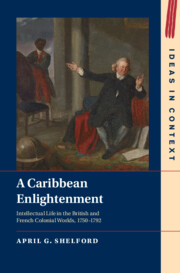Book contents
- A Caribbean Enlightenment
- Ideas in Context
- A Caribbean Enlightenment
- Copyright page
- Dedication
- Contents
- Figures
- Maps
- Tables
- Acknowledgments
- Note on the Text
- Abbreviations
- Chapter 1 What Is a Caribbean Enlightenment?
- Part I Before Breadfruit
- Part II Creating Enlightened Citizens
- Part III Tristram in the Tropics: or, Reading in Jamaica
- Introduction to Part III
- Chapter 7 Whence, Whither, and Which Books?
- Chapter 8 “Truth Hard to be Discovered”
- Chapter 9 Containing the Overflowing Fountain of His Brain
- Conclusion to Part III
- Part IV Cultivating Knowledge
- Bibliography
- Index
Chapter 8 - “Truth Hard to be Discovered”
The Commonplace Books of Thomas Thistlewood
from Part III - Tristram in the Tropics: or, Reading in Jamaica
Published online by Cambridge University Press: 14 September 2023
- A Caribbean Enlightenment
- Ideas in Context
- A Caribbean Enlightenment
- Copyright page
- Dedication
- Contents
- Figures
- Maps
- Tables
- Acknowledgments
- Note on the Text
- Abbreviations
- Chapter 1 What Is a Caribbean Enlightenment?
- Part I Before Breadfruit
- Part II Creating Enlightened Citizens
- Part III Tristram in the Tropics: or, Reading in Jamaica
- Introduction to Part III
- Chapter 7 Whence, Whither, and Which Books?
- Chapter 8 “Truth Hard to be Discovered”
- Chapter 9 Containing the Overflowing Fountain of His Brain
- Conclusion to Part III
- Part IV Cultivating Knowledge
- Bibliography
- Index
Summary
In addition to serving as instruments of pedagogy and moral instruction, commonplace books helped readers assert control over an ever-increasing quantity of printed material. During the eighteenth century, they were a perfect tool for making reading truly “useful.” Inherently idiosyncratic, the evidence from commonplace books is difficult to generalize; nevertheless, they capture the moment when readers appropriated Enlightenment ideas to address their own concerns. This chapter focuses on Thomas Thistlewood’s commonplace books to track his thinking about race and slavery as well as religion. Initially motivated by the need to learn about plantation management, his reading expanded from planters manuals to works that both promoted and challenged theories of racial difference, urged reform of the institution of slavery, and contained dire warnings of slave rebellions. Thistlewood’s readings on religion combined a deep skepticism of Christian orthodoxy with anxieties about divine justice and a search for personal transcendence, which culminated in his enthusiastic approval of the deism expressed by Jean-Jacques Rousseau’s Savoyard vicar.
Keywords
- Type
- Chapter
- Information
- A Caribbean EnlightenmentIntellectual Life in the British and French Colonial Worlds, 1750–1792, pp. 197 - 219Publisher: Cambridge University PressPrint publication year: 2023

